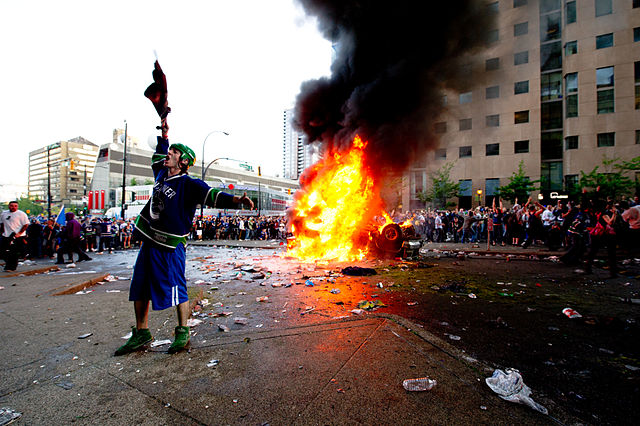Like this article? rabble is reader-supported journalism. Chip in to keep stories like these coming.
“When a mob of mostly white people take to the streets, vandalizing cars, storefronts and street signs in the process it usually means someone either won or lost a game.” Those words were written in an April 2015 article by Mic.com‘s Derrick Clifton describing the differences in media coverage of white riots versus black demonstrations.
When we turn on our televisions or open our internet browsers to get a live-feed of a riot going on in a downtown core, are we doing so with the expectation that we may one day look back on vandalism or violent altercations with law enforcement with a feeling of jolly complacency? It seems strange to think that. Aside from the biased media coverage of some riots, we as individual citizens, may also signal a particular kind of approval of a particular kind of riot.
The Electric Theatre Company in Vancouver is allegedly doing just that. Putting together a 2011-Stanley Cup-riot-themed musical, that is. An ad appeared on Craigslist one week ago explaining the plan.
“Our next world premiere, RIOT, has us diving into the 2011 Stanley Cup Riot with Hard Rubber Orchestra. A large scale live music, theatre, dance and multi-media work, RIOT will delve into the deeper human conditions that underlie people’s tendency to riot, and Vancouver’s long record of rioting.”

In the era of #BlackLivesMatter organizing — which aren’t riots, but are often automatically painted as riots regardless of the presence of violence or not — the thought of moulding a demonstration into a source of merriment is to turn it into a caricature of its former self. #BlackLivesMatter does not have the luxury of being “silly” or “fun.” The organizers are seldom allowed to make mistakes, lest they be seen as an undesirable consequence of democracy. In such serious subject matter, even being completely serious and speaking very intentionally can land one in trouble.
In November of 2014 #BlackLivesMatter organizers stated that during demonstrations white and non-black allies should stand at the back or sides, not the centre. Amongst the unfortunate tidal wave of “#AllLivesMatter” derailments, people questioned whether it was an “anti-racist rally or a pro-segregationist one.” Aside from illustrating how little people know about what segregation actually is, it proves that even when organizers are honest, non-violent, and political, if they aren’t perpetually seeking approval, they’re always “wrong.”
In July of 2015, #BlackLivesMatter protesters blocked traffic on Toronto’s Allen Expressway. Freedom of assembly, or the right for individuals to come together as a collective and express and defend ideas, is a civil liberty protected by Section Two of the Canadian Charter of Rights and Freedoms. It is a fundamental freedom and a cornerstone of contemporary democracy. Yet, even the comments section on a CBC article regarding the demonstration was littered with statements such as, “Protest and block your own neighborhoods…the rest of us have things to do.”
Protests aren’t actually supposed to be all that convenient. Another comment, which has been — and still is — echoed by many, said, “Every single person that disrupted traffic in this illegal protest should be arrested and put in jail. Facial recognition can be used to track these people down and they should be punished to the full extent of the law.”
Ironically, when Vancouver was met with sports-related protests, not every single person should have been punished to the fullest extent of the law. Bob Whitelaw, an individual who penned over 100 recommendations for British Columbia’s attorney-general and the British Columbia Police Commission after a 1994 Vancouver riot, even considered the word use of “hooligan” as too strong.
“They talk about hooligans….Many of them seemed to be just young people who were out to have some fun and got caught up in it and that’s unfortunate.”
Of course, 2011 was not the first (or last) time people rioted over sports. Alternet compiled a list that included other instances such as, the University of Kentucky Wildcats winning the NCAA Championship in 2012 and the Boston Red Sox winning the World Series in 2004, 2007, and 2013. There are also video compilations of news coverage showcasing the differences in vocabulary used when a journalist is describing a white riot versus a black protest.
Making a musical out of the 2011 Stanley Cup riots in Vancouver, while seemingly benign, is in poor taste. It suggests that we should mould an act of mass violence into something silly — perhaps even igniting a few “I remember when I was young and…” moments.
It also signals to us what we can validate and what we always must condemn. Throughout all of this, we must question who it is we are laughing at and who it is we are laughing with. The answers may reveal a truth that most of us do not want to come face to face with.
Ashley Splawinski is a student at the University of Toronto. Previously, Ashley worked as a producer and host of News Now on CHRY 105.5 FM covering Canadian social, political, and environmental issues. You can visit her personal blog, Lion Politics and follow her on twitter @asplawinski.
Like this article? rabble is reader-supported journalism. Chip in to keep stories like these coming.
Image: Wikimedia Commons



